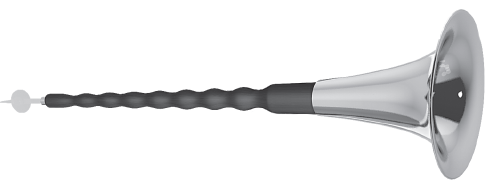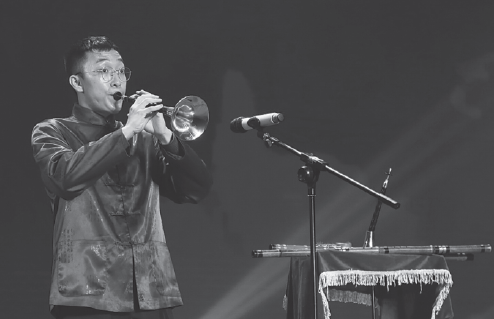The wind of change
Traditional Chinese musical instrument, the suona, is enjoying a popular revival thanks to the power of social media, Chen Nan reports.

On Oct 21, a student of the Middle School Affiliated to Xi'an Conservatory of Music, Shaanxi province, shared a video on the internet, in which he performed the iconic piece, Summer, composed by Japanese musician Joe Hisaishi. The piece, which was featured in Japanese director Takeshi Kitano's 1999 movie, Kikujiro, was adapted by the Chinese student for suona, a Chinese traditional wind instrument with a double-reed mouthpiece.
The video became popular online and it inspired another player, Lin Shenli, a Shenzhen-based electrical engineer, to pick up the suona again, an instrument he had learned as a child, but which he had not played for some time.
"In the video, there were other students playing musical instruments, such as piano and the zhongruan (a plucked long-necked lute-like stringed instrument), but the sound of the suona is the most piercing and memorable," says Lin, 29. "After watching the video, I took out my suona and tried to perform the same piece with my own interpretation."
On Nov 4, Lin posted his first video playing the suona on social media platforms, such as video-sharing platform Bilibili and microblogging platform Sina Weibo. His rendition of Hisaishi's Summer received over 1 million views.
"I didn't expect the video to be so popular among the viewers. I did it just for fun," says Lin, who has made several more videos of himself playing his suona since then.
He has performed a variety of musical works, such as the hit song, Ordinary Road, written and performed by Chinese singer-songwriter Pu Shu, and the nostalgic soundtrack of 1992 TV drama, The Legend of White Snake.
Fans applauded at his suona technique and were surprised by the versatility of the musical instrument, commonly seen as one with a bright, full sound and high pitches that can produce mirthful or heartbreaking melodies at both weddings and funerals in rural northeastern China. Although now a traditional instrument, it was introduced into China from Persia or the Arab world in the third century.
Throughout the novel coronavirus pandemic, Lin has been uploading videos every week, hoping to offer entertainment for people who had to stay at home and might be bored. The pieces he selected were usually tracks found on the music charts released by major music streaming platforms, such as QQ Music and NetEase Cloud Music.
"The process of adapting those music works is easy for me because the suona has a wide tonal range," says Lin, who records his content at home after work.
Many viewers left comments for Lin saying that his videos are hilarious. "What makes me happier is that some viewers have gained a different perspective about the age-old musical instrument," Lin says.
One of the most impressive comments he received is: "The stereotype is wrong. The suona is so commonly seen that its sounds have been ignored. In fact, it's a beautiful musical instrument rather than something simply making a high-pitched sound."
Born and raised in Guangzhou, Guangdong province, Lin graduated with his master's degree in electronic engineering from Zhejiang University in 2017 and has been working in Shenzhen as an electrical engineer since.
Music has always been a part of his life, although Lin never considered taking it as a career.
He learned to play bamboo flute 10 years ago and he also plays the suona and sheng (a traditional Chinese wind instrument).
"It was hard to play the right tones when I learned these traditional instruments, but I played them for fun, so the learning process was full of joy because I was under no pressure," Lin says.
Traditional Chinese musical instruments, such as the suona, have gained a new fan base among the younger generation thanks in part to social media platforms, such as Chinese short video-sharing platform Douyin.
From April 10 to 13, Douyin launched an electronic music festival titled DouLand, during which several young Chinese suona players displayed their musical talent by illustrating what the musical instrument can do.
One of them, named Chuanzi, in his early 30s, adapted a remastered vocal version of Norwegian music producer Alan Walker's hit, The Spectre. To Chuanzi's surprise, Walker left him the message "brilliant, love this" after watching his suona version of the song.
Another suona player who goes by the stage name, Asheng, has been covering hit songs with the instrument since 2016. In one of his videos, clad in a hoodie and cap, Asheng played American singer-songwriter Billie Eilish's Bad Guy with a saxophone and a suona, which was watched over 800,000 times.
In another performance, the 27-year-old from Shenyang, Liaoning province, adapted Lemon, the chart-topping song by Japanese music star Kenshi Yonezu, on the suona, which garnered over 2 million views.
Asheng, who studied in Taiwan, graduating with a major in traditional Chinese music in 2018, learned to play suona when he was in high school.
He admits that people's prejudice against traditional Chinese musical instruments has limited the development of the suona.
"Few people want to learn it, because they consider it 'unfashionable'. Many people don't know the capability of the musical instrument," says Asheng.
He mentions Song of the Phoenix, the final film released in 2016 of the late director Wu Tianming (1939-2014), which depicts a young suona apprentice who wants to form his own musical troupe at a time when the presence of traditional instruments is in decline in contemporary Chinese society.
"The suona is good at depicting joyful, noisy, and grand scenes," Asheng says. "Song of the Phoenix is also the name of the best-known classic piece featuring the suona, which uses the instrument to imitate the sounds of various birds, depicting dynamic nature and a joyous mood. It shows the instrument's versatility."



Today's Top News
- Vote for good governance in Hong Kong: Editorial
- China blasts Japan over radar-illumination claim, warns against 'militarism'
- Chinese Navy accuses Japan of interfering with training operations
- China releases new insurance-covered medicine list
- Voting kicks off in Hong Kong's LegCo election
- Zero tolerance for revival of Japanese militarism






























